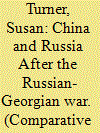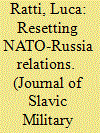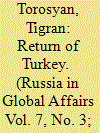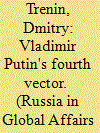| Srl | Item |
| 1 |
ID:
103921


|
|
|
|
|
| Publication |
2011.
|
| Summary/Abstract |
China's public disagreement with Russia's actions during the Russian-Georgian War as well as China's decision not to support Russia's recognition of South Ossetia and Abkhazia demonstrate that despite their partnership, China and Russia pursue different strategies to gain power and influence. But is this to the detriment of their future relations? Drawing from over 800 Chinese news articles written after the war, I show that while China showed disapproval of Russia's actions internationally, domestically it used the war to highlight the escalating tensions between the East and West, and took a strategic stand on the side of the East.
|
|
|
|
|
|
|
|
|
|
|
|
|
|
|
|
| 2 |
ID:
094359


|
|
|
| 3 |
ID:
123221


|
|
|
|
|
| Publication |
2013.
|
| Summary/Abstract |
This article provides an analysis of the 'reset' policy toward Russia, which was inaugurated in 2008 by the Obama administration and soon embraced by the North Atlantic Treaty Organization (NATO). It argues that, rather than being prompted by domestic dynamics in the United States, the 'reset' was a response to systemic pressures. More specifically, the West's relative decline on the international system, the retrenchment of expeditionary NATO, and the rise of potentially revisionist powers. Although prompting an improvement in the relationship, these pressures failed to bring about Russia's full integration into the post-Cold War Western international settlement. In the immediate aftermath of the 2008 Russian-Georgian War, NATO's relations with Moscow experienced an initial revitalization through a resumption of the works of the NATO-Russia Council (NRC), the signing of a New Start Treaty between the United States and Russia in 2010, and an expansion of supply lines to Afghanistan through Russian territory. However, there was no real incentive for both sides to truly 'reset' the relationship. The alliance never treated Russia equally, preferring instead to dictate conditions. Any discussion of Russian-NATO relations was couched in this context; the 'reset' was also conceived as a small gift to Moscow. For its part, the Kremlin never accepted a junior partner status, making it clear that its preferred option remains the alliance's dissolution and the creation of a different, new pan-European organization that would incorporate the Russian Federation as a full member. The article concludes that, despite the mixed achievements of the 'reset', the alliance retains a systemic incentive to seek durable cooperation with Russia.
|
|
|
|
|
|
|
|
|
|
|
|
|
|
|
|
| 4 |
ID:
091345


|
|
|
| 5 |
ID:
095909


|
|
|
|
|
| Publication |
2010.
|
| Summary/Abstract |
The financial turmoil originating from the U.S. subprime mortgage crisis hit Russia by early September 2008, prompting the Russian government and the Central Bank of Russia to undertake a set of speedy and concerted measures to soften the impact of the crisis. These initial measures supported the value of the ruble as ruble holders, domestic and foreign, switched to dollars. They also provided hard currency to major Russian banks and Russian big business (the so-called oligarchs) which had borrowed heavily from foreign banks for their expanding operations from 2000 to 2007.
|
|
|
|
|
|
|
|
|
|
|
|
|
|
|
|
| 6 |
ID:
122364


|
|
|
|
|
| Publication |
2013.
|
| Summary/Abstract |
Tendencies will continue - a geopolitical shift towards Eurasia and the Asia Pacific Region; symbolic 'sovereignization' of Russia and its further distancing from the U.S. and Europe; and the erosion of a foreign policy consensus. The fourth edition of Putin's foreign policy will most likely differ significantly from the previous three.
|
|
|
|
|
|
|
|
|
|
|
|
|
|
|
|